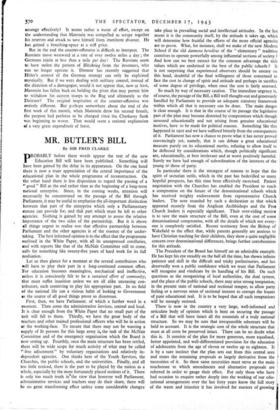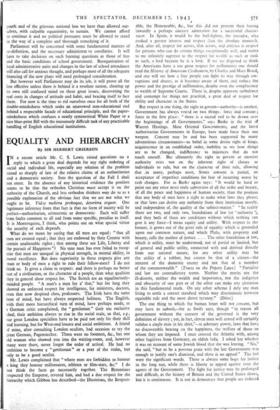MR. BUTLER'S BILL
By SIR FRED CLARKE
PROBABLY before these words appear the text of the new Education Bill will have been published. Something will have been gained by the delay in its appearance, On the one hand there is now a truer appreciation of the central importance of the educational plan in the whole programme of reconstruction. On the other hand there is less disposition to regard the passing of a " good " Bill as the end rather than as the beginning of a long-term national enterprise. Since, in the coming weeks, attention will necessarily be concentrated on the passage of the Bill through Parliament, it may be useful to emphasise the all-important distinction between that part of the enterprise which only a Parliamentary statute can provide for, and thit part which must be left to other agencies. Nothing is gained by any attempt to assess the relative importance of the two sides of the partnership. But it is above all things urgent to realise now that effective partnership between Parliament and the other agencies is of the essence of the under- taking. The best informed opinion is to the effect that the programme outlined in the White Paper, with all its unexpressed corollaries, and with reports like that of the McNair Committee still to come, calls for something like twenty-five years of hard work for its full realisation.
Let us then glance for a moment at the several contributors who will have to play their part in a long-continued common effort. For education becomes meaningless, mechanical and ineffective, unless it is consciously felt to be a sustained effort of community, that must suffer inanition unless we are all alike unceasing con- tributors, each contriving to play his appropriate part. In no field of the national life can a vicious habit of looking to Government as the source of all good things prove so disastrous.
First, then, we have Parliament, of which a further word in a moment. Then come the administrative iervices, central and local. It is clear enough from the White Paper that no small part of the task will fall to them. Thirdly, we have the great body of the teachers and other trained professional officers who will be in action at the working-face. To ensure that there may not be wanting a supply of fit persons for this large army is, the task of the McNair Committee and of the emergency organisation which the Board is now setting up. Fourthly, once the main structure has been settled, there will be wide scope for much activity of what may be called "free adjustment" by voluntary organisations and relatively in- dependent agencies. One thinks here of the Youth Services, the Churches, the public schools, and the universities. Finally, and all too little noticed, there is the part to be played by the nation as a whole, especially by the more fortunately placed sections of it, There is only too much truth itithe view that however well Parliament, administrative services and teachers may do their share, there will be no great transforming effect unless some considerable changes take place in prevailing social and intellectual attitudes. In the last resort it is the community itself, by the attitude it takes up, which will determine how fruitful the efforts of the more official agencies are to prove. What, for instance, shall we make of the new Modern School if the old damnosa hereditas of the " eleinentary " tradition • contrives to operate powerfully among influential sections of society ?
And how can we best extract for the common advantage the rich values which are enshrined in the best of the public schools ? It is not surprising that experienced observers should be uneasy on this head, doqbtful of the final willingness of those concerned to face the cost in change of spirit and attitude and perhaps in sacrifice of some degree of privilege, when once the cost is fairly assessed.
So much by way of necessary caution. The immediate urgency is, of course, the passage of the Bill, a Bill well thought-out and generously handled by Parliament to provide an adequate statutory framework within which all that is necessary can be done. The main danger is clear enough. It is that in the course of its passage the legislative part of the plan may become distorted by compromises which though unsound educationally and not arising from genuine educational motives, have to be made for political reasons. Something like this happened in 1902 and we have suffered bitterly from the consequences of it. Parliament has now a chance to prove what it has never proved convincingly yet, namely, that it can debate a great educational measure purely on its educational merits, refusing to allow itself to be deflected by considerations which, though politically significant are, educationally, at best irrelevant and at worst positively harmful. Surely we have had enough of subordination of the interests of the young to those of party.
In particular there is the strongest of reasons to hope that the spirit of sectarian strife, which in the past has bedevilled so many hopeful prospects, has this time been effectively exorcised. Patient negotiation with the Churches has enabled the President to reach a compromise on the future of the denominational schools which has received weighty endorsement from representative Church leaders. The note sounded by such a declaration as that which appeared recently from the Anglican Archbishops and the Frea Church leaders is especially significant. Their over-riding .motiva is to save the main structure of the Bill, even at the cost of some denominational compromise, with all the details of which not every- one is completely satisfied. Recent testimony from the Bishop of Wakefield to the effect that, while parents generally are anxious to have Christian teaching for their children, they show a quite negligible concern over denominational differences, brings further corroboration for this attitude.
The President of the Board has himself set an admirable example. He has kept his eye steadily on the ball all the time, has shown infinite patience and skill in the difficult and tricky preliminaries, and has deservedly won a public confidence which we trust that Parliament will recognise and vindicate by its handling of his Bill. On such questions as the reorganising of local authorities, the dual system, and the place of the public schools, there may arise strong temptation, in the present state of national and sectional temper, to allow party feeling or a nervous sense of sectional interest to corrupt the founts of pure educational zeal. It is to be hoped that all such temptations will be strongly resisted.
There is now in the country a very large, well-informed and articulate body of opinion which is bent on securing the passage of a Bill that will leave intact all the essentials of a truly national structure. So we may be sure that irresponsible saboteurs will be held to account. It is the strategic core of the whole structure that must at all costs be preserved intact. There can be no doubt what this is. It consists of the plan for more generous, more equalised, better appointed, and well-differentiated provision for the education of adolescents from the age of eleven or twelve up to eighteen. It is by a sure instinct that the plan sets out from this central area and treats the remaining proposals as largely derivative from the necessities of it. So these same necessities must serve as the main touchstone to which amendments and alternative proposals are referred in order to gauge their effect. For only those who have had occasion to enquire rather deeply into the working of our edu- cational arrangements over the last forty years know the full story of the waste and injustice it has involved for masters of growing youth and of the grievous national loss we have thus allowed our- selves, ,with culpable equanimity, to sustain.. We cannot afford to continue it and no political pressures must be allowed to stand in the way of a complete and thorough remedying of it.
Parliament will be concerned with some fundamental matters of re-definition, and the necessary administrat ye corollaries. It will have to take dedsions on such burning questions as those of fees and the basic conditions of school government. Reorganisation of local administrative units and changes in the law of school attendance will also call for anxious thought, and perhaps most of all the adequate financing of the new plans will need prolonged consideration.
But however well Parliament may do its job, it will prove all the less effective unless there is behind it a resolute nation, clearing up its own still confused mind on these great issues, discovering the real costs in changes of attitude and habit, and bracing itself to face them. For now is the time to rid ourselves once for all both of the double-mindedness which seeks an unavowed non-educational end behind a respectable facade of educational principle, and the paper- mindedness which confuses a neatly symmetrical White Paper or a nice blue-print Bill with the immensely difficult task of any practicable handling of English educational institutions.



























 Previous page
Previous page